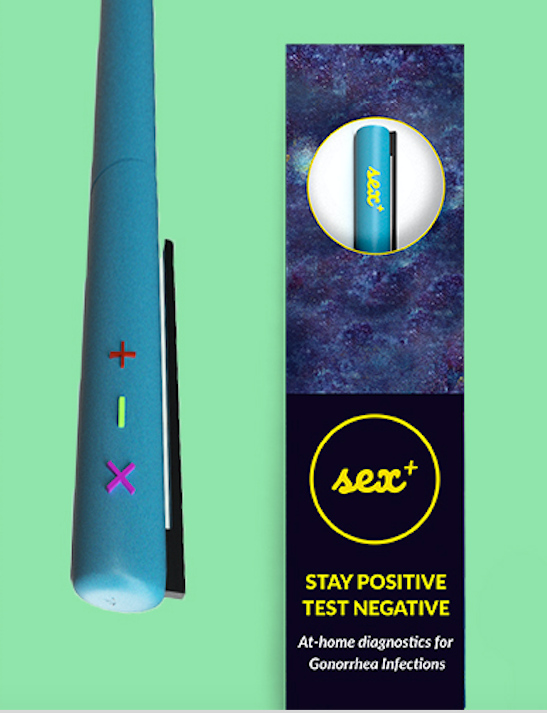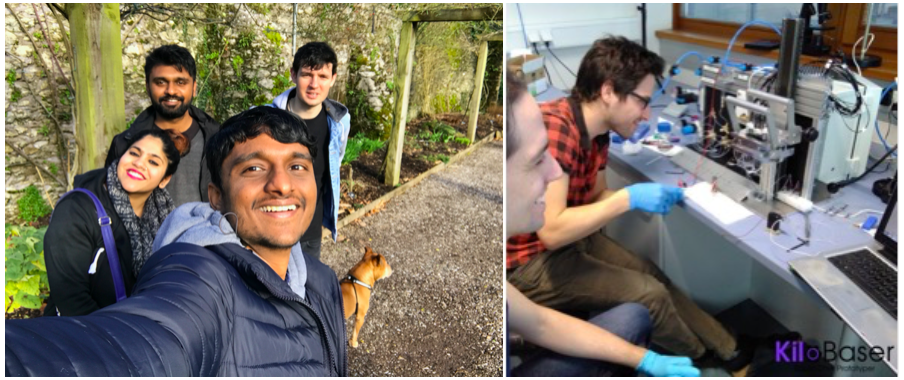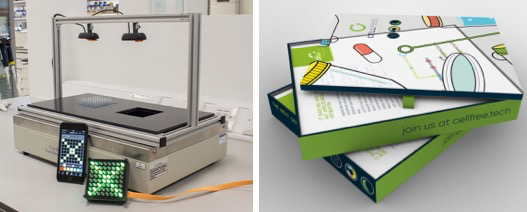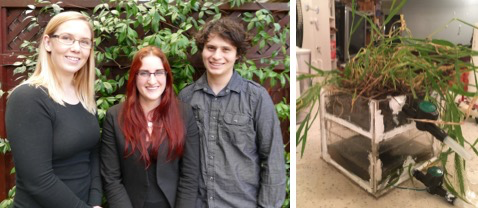How synthetic biology startups are building the future at RebelBio
The accelerator is helping scientists turn their moonshot visions into viable businesses, fast.
 A 1925 artist's conception of what Nikola Tesla's wireless power transmission system might look like in the future (source: Wikimedia Commons)
A 1925 artist's conception of what Nikola Tesla's wireless power transmission system might look like in the future (source: Wikimedia Commons)
Biology is becoming the new digital. As the engineering of biology starts delivering solutions at industrial scale while becoming more data-driven and automated, investors are getting excited to fund breakthrough biotechnologies that unlock this potential for a whole range of industries.
Europe has been steadily rising as a global hub for innovation and is attracting big bets from veteran VC investors. It has even been hailed as the “New Silicon Valley.” Boasting an active DIY biology scene, world-class institutions and productive innovation ecosystems, the continent is a fertile base to grow global startups from the early stage to the next level.
Accelerators are indispensable elements to harness this early-stage innovation, which often remains locked up in institutions or falls into the “Valley of Death,” the often deadly funding gap between those first discoveries and a working prototype.
This is the stage the RebelBio accelerator comes in to help startups solve global grand challenges—with life itself.
An Innovation Engine
It’s as exciting in biology today as it was in the computer industry in the late ’70s, when the Apple II came out. Computers became personal.
As Steve Jobs said, “I think the biggest innovations of the 21st century will be at the intersection of biology and technology,” the ethos of RebelBio is to bend and break the rules of the status quo at the intersection between these two disciplines.
A total of 15 multidisciplinary teams from across the world have begun the latest program at RebelBio, garnering an investment of over $100,000 for each company. In addition to gaining access to fully equipped labs and office spaces, they also draw from a network of hundreds of mentors, including RebelBio-founder Bill Liao, who also cofounded Xing, Davnet, and CoderDojo.
The program helps the founders to make their longer-term moonshot visions (the “innovation” part) into feasible projects which generate revenue early on (the “engine” part). It is transforming scientists into entrepreneurs across diverse areas of life sciences and is currently in its fourth batch.
From novel biomaterials to new ways to brew the foods we love, from speeding up cancer lab tests turning days into hours, to a microbe-miner discovering life-saving antibiotics. We even have a machine learning startup for drug discovery, and another working on microbial fuel cell modules to treat wastewater while generating electricity!
Bill Liao, founder of RebelBio and general partner at SOSV
So what kind of startups are brewing at RebelBio?

Diagnostics 2.0: Rapid, Portable, and Personal
One RebelBio startup is Sex Positive, founded by Nico Bouchard and Mary Ward, cofounders of Counter Culture Labs and both biohackers from California. Developed as a smart diagnostic device for sexually transmitted infections, Sex Positive is enabling rapid self-testing of sexual health in the privacy of one’s own home, without the need for a hospital lab. The first test will be for chlamydia. The device combines fluid dynamics, immunology, genetics and electronics designed by a Tesla engineer remotely in Palo Alto.
Meanwhile, KaitekLabs is founded by Emilia Diaz from Chile, who is turning bacteria into living computers. They function as a ready-to-use, portable biosensor kit to detect shellfish toxin directly from shellfish—a major food source for many people living in coastal regions around the world. It makes the invisible poison orange! The startup has already sold out a batch of the first prototype.
Then, OaCP (Oncology and Cytogenetic Products) is a university spin-out from Bologna, Italy, using its patented reagents to speed up diagnostics. Since many in vitro diagnostic tests for cancer can take over three days of agonized waiting, OaCP uses a novel reagent which enhances hybridization of nucleic acid probes. This reduces the diagnosis time to as little as two hours. As the applications are versatile, the reagent can also be used to accelerate bottlenecks in genome sequencing, genome editing, or liquid biopsies.

DNA As the New Silicon
As biology is becoming an information technology, DNA emerges as the new silicon.
For instance, Helixworks Technologies is the first to offer storage of digital data in DNA. The startup is now developing a new product: a portable molecular machine (dubbed OpenMOSS) that converts digital data into DNA—in your home.
By storing data completely offline in a medium as durable and dense as DNA, Helixworks could provide a biological solution to the rapidly expanding need for cost-effective, long-term data storage while addressing the rising threat of cybersecurity. Storing large or sensitive sets of data completely offline in a physical medium offers safety from cyberthreats. The startup recently won the “Most Innovative” award at pitch competition SXSW.
Tools that make it easier to program life are a running theme across the cohorts, with another example, Briefcase Biotec: it’s building a DNA synthesizer called Kilobaser, “the Nespresso Machine of DNA synthesis”: simply add a reagent-cartridge and enter your sequence! The machine will make oligos and primers quickly and cheaply directly on the lab bench.
Moirai Biodesign is also adopting this modular approach, in their case to build programmable cancer therapeutics with “Plug-and-Play RNA”. The molecule consists of two domains, whereas the sensor part reacts to the presence of cancer-specific biomarkers, while the trigger part encodes a certain protein. Allowing for switch-like activation of the biodevice, specifically in cancer cells, this targeted therapeutic holds great promise to alleviate side-effects of cancer therapy in the future.

Personal Maker Kits to Build with Biology
Tools like these could be used in conjunction with a bio-maker kit, like BentoLabs and AminoLabs—or an entirely new kind. Hence, Cell-Free is breaking a billion-year-old processor out of the cell to enable anyone, anywhere to manufacture biomolecules with a cell-free machinery: a “Raspberry Pi” model for biology.
In coming years, point-of-care synthesis of products like insulin and vaccines could drastically improve the availability of medicines. For now, the startup is envisioning consumer biotech applications to enable anyone to make custom colors, smells, logic circuits—even glow-in-the-dark ink! The founders aim to bring technology and biology closer together.
Biological sensors, detectors and processors will be core to this. We are building the tools that will allow innovators from all backgrounds to engineer the materials of the future.
Dr. Thomas Meany, cofounder and CEO of Cell-Free Technologies

From Machine Learning to a “MicrobeMiner” to Unlock New Medicines
Continuing on the health theme, clinical trials and approval for new medicines are devastatingly time-consuming, costly, and risky; while the rise of antibiotic resistance poses a rising challenge to global health.
Galactica Biotech is using machine learning algorithms with multiple highly trained modules to identify potential new uses for existing medicines, from small molecules to complex plant alkaloids. The process even works backward to find new targets for these drugs, as well as identifying off-target effects for toxicology studies. This means they will offer their multiapproach A.I. as a service to pharmaceutical companies to help them unlock the full potential of their drug discovery pipeline toward a future of precision medicine. They’ve just used their algorithm successfully to identify a new anticancer lead molecule in the lab, which is already approved for another indication. The team hails from Russia, Spain, Mexico, and the UK. It brings together expertise from PhD research in computational medicinal chemistry, artificial intelligence, systems, and synthetic biology.
CyCa OncoSolutions is founded by Dr. Nusrat Jahan and curious things can happen when a chemist is doing biology. She discovered a biomolecular machinery to permeate the cell membrane. This allows for more effective and targeted delivery, for instance, of cancer drugs. The young innovator and principal investigator worked relentlessly all around the world, from the universities of Oxford, Leiden, and Kyoto to ETH Zurich, driven to find a solution to her father’s life-shattering cancer diagnosis.
Valanx Biotech, on the other hand, makes programmable designer proteins, for instance, to conjugate them to a targeting antibody. It uses versatile click-chemistry to easily dock new molecules to the protein with its patented technology “SnapIt.”
In software, we mine for bitcoins, whilst in biology, we mine for antibiotics! Prospective Research, Inc. has developed a platform that mimics stimuli in the soil to mine for novel, life-saving antibiotics from Streptomyces bacteria.
How? With what it calls the MicrobeMiner platform. Why? Because the next billion-dollar drug could be buried in your backyard. Therefore, the team also sends out the MicrobeMiner kits for sample collection to crowd-source that discovery.
About 90% of natural products remain hidden in the silent operons of the microbe’s DNA, unless the pathway is induced. The biosynthetic machinery of antibiotics can be initiated by certain stimuli in the soil matrix though. Hence, the microbes are first screened with the GeneMiner technology, which identifies the gene clusters that are silenced in the absence of these inducers.
For the second step, StimKeys comes into play: this proprietary platform launches a variety of chemical inducers with the aim to unlock these potent chemical pathways. They’ve indeed identified molecules which turn a seemingly uninteresting “dirt microbe” into a powerful factory for novel, potentially life-saving antibiotics.

Growing the Circular Economy: Bio-inspired Design, High-tech Ecosystems and new Biomaterials
Urbanization is a global trend that will drastically change how we live. By 2050, up to 66% of the world’s population will live in cities, according to the United Nations. That means we need better solutions to power, feed and clean up our future megacities.
Therefore, developing a productive circular economy is imperative to make human activity more sustainable and improve the health of our planet. Biomimicry can help us unlock nature’s most resource-efficient blueprints to future-proof humanity. Hence, building smarter, zero-carbon cities with biology has already started.
For example, NuLeaf Tech is combining the technologies of engineered ecosystems with microbial plant fuel cells as part of a biologically inspired hardware module that treats wastewater to create clean water and generate energy. These were the ideas that gave rise to NuLeaf Tech in the NASA Ames Advanced Studies Lab in 2015.
The team is testing a first prototype in collaboration with local farmers, with the vision to create high-tech ecosystems and artificial, modular wetlands—even in vertical arrangement for use in the home.
Our bio-inspired technology will create purified water and clean energy solutions for industry and residential use.
Rachel Major, cofounder and CEO of NuLeaf Tech
So, bio-inspired design helps us uncover powerful engineering solutions—and even novel materials!
Examples of sustainably manufactured materials include the ability to 3D-print degradable bioplastics and make useful items from the plastic waste, in which the planet is drowning. This is an area Saphium and BioCellection are working on.
On the other hand, Pili is growing beautiful, living color pigments for print and design from bacteria at an industrial scale, and Chinova Bioworks is turning to mushrooms for new biomaterials.

The Foods of the Future? They’re Brewed, Too!
It’s never been a more exciting time for animal lovers, because we’re entering the post-animal economy. A rapidly increasing number of animal-free products are in development around the world. Examples include allergy-free peanuts (Aranex Biotech), genome-edited plants to grow the designer foods of the future (PlantEdit), and in vitro meat at our sister program IndieBio SF (Memphis Meats).
But what about sustainable beverages?
Perfect Day (formerly Muufri) is a vegan alternative to milk which has been hitting the headlines as long-awaited animal-free dairy. At the same time, Spira is looking to lock on to the health market with a tasty, nutritious drink produced by Spirulina algae.
Afineur, is cofounded by CEO Dr. Camille Delebecque. Their Cultured Coffee, produced by microbial fermentation, is taking New York by storm. And what better alternative to sweeten your caffeine fix, but with MilisBio’s sweetener proteins?
Seeing as these plug-and-play vegan plant proteins are up to 700 times sweeter than sugar, the MilisBio team is addressing the demand for non–carbohydrate-based artificial sweeteners in a world hooked on sugar.

Hacking the Plant Biofactory
Another major area of biotech innovation is programming microorganisms and plants to produce useful compounds and novel biomolecules.
For example, Hemoalgea is cofounded by a team of bioengineers from Costa Rica. The startup is using an optimized microalgal factory to make Hirudin, a major anticoagulant originally produced in leeches. The algae has been found to produce complex glycosylation patterns unlike other biomanufacturing platforms. Meanwhile, SwaLife Biotech is extracting novel alkaloids from plants, which have already shown promising results against DNA breakage. They could find applications in cosmetics, and later on, medicine.
Similarly, Alternative Plants is cofounded by CEO Anna Ramata-Stunda in Latvia. It’s unlocking the hidden treasures of active compounds found in plants by using plant tissue stem cells. This allows to access nature’s reservoir of compounds, while producing them sustainably at large scale, without harm to the often rare and endangered species. The team has already optimized the powerful platform for high yield and is now scaling up the production of cosmetic ingredients with industrial partners.
Canuevo is an Uruguayan-Canadian startup cofounded by Dr. Nils Rehman to launch a paradigm shift for cannabinoid medicine. Their nanoparticle-encapsulation technology can be applied to creams, pills, supplements, and later on, new medicines. Finally, Hyasynth Bio in Canada produces THC and other cannabinoids in highly efficient yeast factories as featured here and in here.
As we see, very exciting things are happening at the intersection of biology and technology. Synthetic biology startups are at the forefront of tackling diverse areas of life sciences to build a better world by programming life.
Hopes are high for astonishing consumer biotech products, delicious foods and beverages, biomaterials and sustainable living, as well as novel medicines and therapeutics—in short, to share the benefits of scientific innovation with people around the world.
Accelerating the Biorevolution
Find out more on the website or this YouTube video and stay up to date by connecting on Twitter and Facebook. You can apply for next year’s cohort on the application portal.
RebelBio (previously IndieBio EU) is the world’s first and leading early-stage startup accelerator and part of SOSV, the accelerator VC. The fund has $300 million in assets under management and is the world’s most active investor in synthetic biology. SOSV is also running the leading seed-stage accelerator IndieBio SF in San Francisco.
